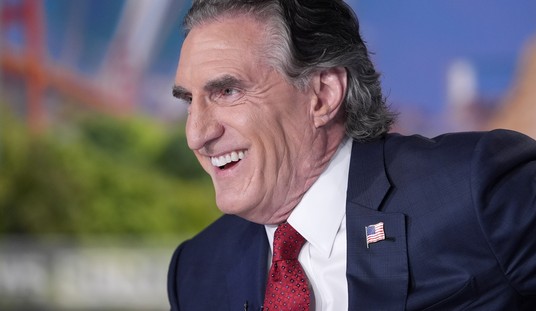Did Donald Trump abuse his authority by ordering a strike on Iranian al-Quds and IRGC commander Qassem Soleimani? Democrats spent the weekend insisting that the president needed congressional authority to take that kind of action against an Iranian target. Sen. Chris Murphy (D-CT) in particular called it an “assassination” in its immediate aftermath, and yesterday said that the predicate of an “imminent” attack on Americans didn’t provide Trump any legal cover for the strike, as well as just generally being a bad idea:
“Qassem Soleimani is an evil man. He has absolutely ordered the murder of hundreds of Americans. But he is a high-level representative of a foreign government, a foreign government with a military that could strike at American civilians and American service people,” the Connecticut Democrat said. “The question is, why didn’t the administration look at other means to try to stop this attack from happening?”
Murphy said Mr. Trump now “has the burden” of telling the American people and Congress why the strike targeting Soleimani was needed to prevent future attacks against the U.S., which he said would justify acting unilaterally.
“The contention here is that by assassinating a high-level Iranian official, that you are actually going to inspire and create more attacks against the United States, not actually prevent those attacks,” he said.
The jury is still out on the good idea/bad idea debate, but what other means would there have been? The best way to end an attack is to kill the person in charge of it. Had we made that decision in 1998 when the US had actionable intelligence on Osama bin Laden, we might have derailed the 9/11 attacks. Or maybe not, but it was very clear that “other means” didn’t work in that instance, and al-Qaeda is less hierarchical than the IRGC.
That brings us to Chuck Todd’s question at Meet the Press yesterday, in which Todd seems convinced that Secretary of State Mike Pompeo was relying on a technicality to justify the strike. Pompeo asks former Homeland Security chief and Pentagon counsel Jeh Johnson whether Pompeo can get away with calling Soleimani a “terrorist” as legal cover. The former Obama administration official tells Todd that it makes no difference. If Soleimani really was plotting an attack on Americans, any president could have ordered the strike (via Twitchy):
This morning, Obama DHS Secretary Jeh Johnson debunked Democrats' claim that Congress needed to approve Soleimani strike
Johnson: Soleimani was a "lawful military objective" & the President had "ample domestic legal authority to take him out" pic.twitter.com/1LUqYAwm9j
— Zach Parkinson (@AZachParkinson) January 5, 2020
CHUCK TODD: So explain for viewers, why does Mike Pompeo keep saying terrorist? There is a legal reason he keeps saying the word terrorist, isn’t there?
JEH JOHNSON: No, not necessarily. If you believe everything that our government is saying about General Soleimani, he was a lawful military objective, and the president, under his constitutional authority as commander in chief, had ample domestic legal authority to take him out without an additional congressional authorization. Whether he was a terrorist or a general in a military force that was engaged in armed attacks against our people, he was a lawful military objective.
Andrew McCarthy emphasizes the point in a column at The Hill. Not only did Trump have justification in preventing new attacks, Soleimani had made himself a target based on the embassy attack in Baghdad — and plenty of others besides that:
Soleimani and al-Muhandis were in the act of making war on the United States. Not just plotting it, though there was plenty of that going on, too.
In late 2019, the Hezbollah Brigades, backed by Soleimani, carried out repeated attacks on U.S. coalition forces in Iraq. There were 11 attacks on bases housing U.S. military personnel in just the last two months. As the Defense Department has recounted, these included “a 30-plus rocket attack on an Iraqi base near Kirkuk that resulted in the death of a U.S. citizen and injured four U.S. service members” as well as members of the Iraqi security forces.
In response, American forces carried out missile strikes against Hezbollah Brigades targets in Iraq and Syria.
After vowing revenge, the jihadist militias stormed the U.S. embassy in Baghdad. Though foiled in the attempt to replicate the 1979 attack in Tehran, in which our embassy was breached and hostages were taken, the brigades — shouting the menacing Iranian refrain “Death to America!” — did significant damage. They burned the outer walls, checkpoint and reception area, smashed windows, and trapped hundreds of diplomatic personnel.
The brigades left graffiti on the walls bragging about the participation of Soleimani and the “Popular Mobilization Commission.” President Trump warned on Twitter that Iran would be held accountable and would “pay a very BIG PRICE.” Iran’s “supreme leader,” Ayatollah Ali Khamenei, scoffed in reply, “You can’t do anything.”
Actually, yes he can, and did so with “ample domestic legal authority,” as Johnson explained. Whether it was wise to do so remains to be seen, but we’ve tried not killing Soleimani on dozens of occasions in the past. That strategy didn’t work out, so Trump decided to try killing him to see if it has an impact on Iranian impunity, expressed so well in Khamenei’s response. We’ll see if it works any better than not killing Soleimani did, but at least it has one virtue — we don’t have to deal with Soleimani any more.








